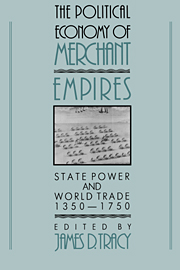Book contents
- Frontmatter
- Contents
- Acknowledgments
- Introduction
- 1 Institutions, Transaction Costs, and the Rise of Merchant Empires
- 2 Merchants and States
- 3 The Rise of Merchant Empires, 1400–1700: A European Counterpoint
- 4 Europe and the Wider World, 1500–1700: The Military Balance
- 5 The Pirate and the Emperor: Power and the Law on the Seas, 1450–1850
- 6 Transport Costs and Long-Range Trade, 1300–1800: Was There a European “Transport Revolution” in the Early Modern Era?
- 7 Transaction Costs: A Note on Merchant Credit and the Organization of Private Trade
- 8 Evolution of Empire: The Portuguese in the Indian Ocean During the Sixteenth Century
- 9 Comparing the Tokagawa Shogunate with Hapsburg Spain: Two Silver-Based Empires in a Global Setting
- 10 Colonies as Mercantile Investments: The Luso-Brazilian Empire, 1500–1808
- 11 Reflections on the Organizing Principle of Premodern Trade
- Selected Bibliography of Secondary Works
- Index
1 - Institutions, Transaction Costs, and the Rise of Merchant Empires
Published online by Cambridge University Press: 25 March 2010
- Frontmatter
- Contents
- Acknowledgments
- Introduction
- 1 Institutions, Transaction Costs, and the Rise of Merchant Empires
- 2 Merchants and States
- 3 The Rise of Merchant Empires, 1400–1700: A European Counterpoint
- 4 Europe and the Wider World, 1500–1700: The Military Balance
- 5 The Pirate and the Emperor: Power and the Law on the Seas, 1450–1850
- 6 Transport Costs and Long-Range Trade, 1300–1800: Was There a European “Transport Revolution” in the Early Modern Era?
- 7 Transaction Costs: A Note on Merchant Credit and the Organization of Private Trade
- 8 Evolution of Empire: The Portuguese in the Indian Ocean During the Sixteenth Century
- 9 Comparing the Tokagawa Shogunate with Hapsburg Spain: Two Silver-Based Empires in a Global Setting
- 10 Colonies as Mercantile Investments: The Luso-Brazilian Empire, 1500–1808
- 11 Reflections on the Organizing Principle of Premodern Trade
- Selected Bibliography of Secondary Works
- Index
Summary
The central purpose of this volume is to explore the role that merchant empires played in the evolution of Europe, from its position as a relatively backward part of the world to its preeminence in 1750. My assignment is not to focus on the evolution of superior military technology or on state-building, but to concentrate on the creation of institutions that permitted trading empires to exist and to be viable, that is profitable. I focus, therefore, on the costs of transacting, which are a function of the institutions and technology human beings create to interact with each other in repetitive dealings. But, of necessity, the analysis is concerned with politics, military technology, and so forth because they all interacted to determine the costs of transacting. In what follows, I state the issues from the perspective of an economist (Section I), explore the evolution of the state in its connection with trading empires (Section II), look at the innovation of commerical and financial instruments that lowered the costs of transacting (Section III), and then consider the development of institutions and enforcement procedures that made those instruments possible and effective (Section IV). Finally, I put this institutional evolution in historical perspective (Section V). An appendix elaborates the theoretical and technical issues.
The international trade model of the economist is the ideal foil against which to examine this evolution. The model is the ideal foil becauseit is frictionless: all of the actors have perfect knowledge, there are no institutions or government, and therefore people interact purely on the basis of comparative advantage.
- Type
- Chapter
- Information
- The Political Economy of Merchant EmpiresState Power and World Trade, 1350–1750, pp. 22 - 40Publisher: Cambridge University PressPrint publication year: 1991
- 37
- Cited by



